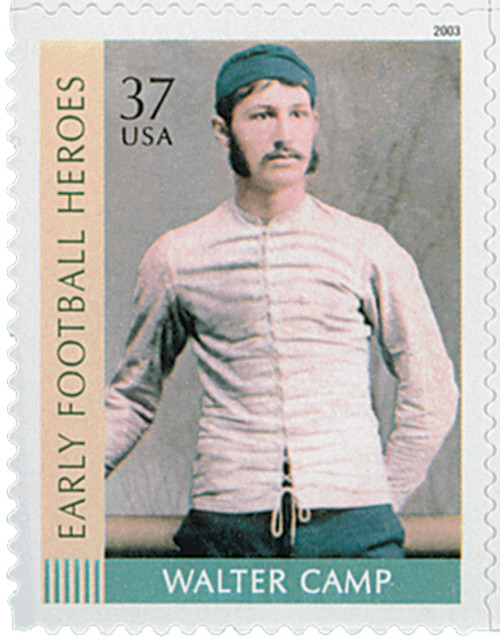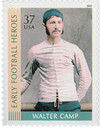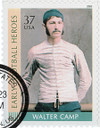
# 3810 - 2003 37c Early Football Heroes: Walter Camp
37¢ Walter Camp
Early Football Heroes
Quantity: 70,000,000
Printing Method: Photogravure
Birth of Walter Camp
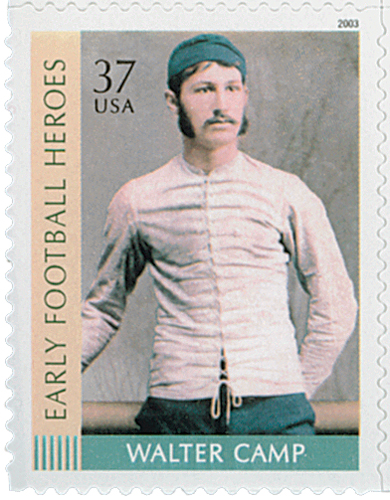
The “Father of American Football,” Walter Chauncey Camp, was born on April 7, 1859, in New Britain, Connecticut. Camp is credited with developing the rules and techniques that set American football apart from British rugby.
Early American football somewhat resembled medieval mob football. In these games, there was no limit to the number of players, and one of the few rules was that players couldn’t commit manslaughter or murder to get the ball. Many American colleges adopted the game, but played by their own rules. Most games eventually turned into brawls. This form of the game was eventually banned from schools. By the 1870s, schools began adopting the “Boston game,” which used round inflatable balls.
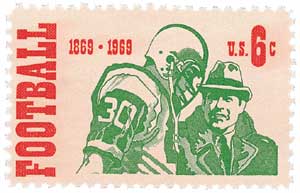
Camp entered Yale College in 1875 and played in the first Yale-Harvard rugby game that same year. He made every varsity team at the school and served as captain of the football team for three years. With him as captain, the team had 25 wins, one loss, and six ties. He was a talented runner, kicker, and sure tackler.
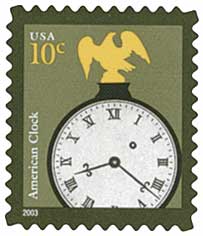
While still a student and player at Yale, Camp was a member of the Intercollegiate Football Association. With this organization, he helped to set some of the rules for the new game of football. When he was a senior, he decreased the number of players from 15 to 11. He also developed the static line of scrimmage. And after a game ended in a scoreless tie, he instituted a rule requiring the offense to gain five yards in three attempts or surrender the ball. Camp also added measuring lines to the field and changed the scoring system.
Camp went on to attend Yale Medical School from 1880 to 1883. However, his time there was interrupted by an outbreak of typhoid fever and he then went to work at the Manhattan Watch Company and later his family’s New Haven Clock Company. Camp coached the Yale football team, unpaid, from 1888 through 1892. He developed specialized training for each player’s position. He also invented the position of the quarterback and the offensive signal call during this time. Camp also developed team drills inspired by the mass-production techniques used as the family watch company where he still worked. His teams won 67 games and lost only 2. He then went on to coach at Stanford University.

For decades, Camp joined with sports columnist Caspar Whitney to form the annual All-American team. He also edited the annual college football guide for 42 years. By 1892, Camp had developed many of the rules that made football the game it is today. And at the age of just 33, he was already dubbed the “Father of American Football.”

Despite all of Camp’s changes, the game was still violent. At one point, President Theodore Roosevelt said he would abolish football unless substantial changes were made. Camp introduced the forward pass and devised guidelines that reformed the game, making it both safer and more exciting.

During World War I, Camp supervised the physical conditioning of the armed services. President Wilson even had Camp train members of the government in Camp’s exercise routine, called the “Daily Dozen.” Over his lifetime, Camp also wrote nearly 30 books and over 350 magazine articles. Camp died on March 14, 1925. He was inducted into the College Football Hall of Fame as a coach in 1951.
37¢ Walter Camp
Early Football Heroes
Quantity: 70,000,000
Printing Method: Photogravure
Birth of Walter Camp

The “Father of American Football,” Walter Chauncey Camp, was born on April 7, 1859, in New Britain, Connecticut. Camp is credited with developing the rules and techniques that set American football apart from British rugby.
Early American football somewhat resembled medieval mob football. In these games, there was no limit to the number of players, and one of the few rules was that players couldn’t commit manslaughter or murder to get the ball. Many American colleges adopted the game, but played by their own rules. Most games eventually turned into brawls. This form of the game was eventually banned from schools. By the 1870s, schools began adopting the “Boston game,” which used round inflatable balls.

Camp entered Yale College in 1875 and played in the first Yale-Harvard rugby game that same year. He made every varsity team at the school and served as captain of the football team for three years. With him as captain, the team had 25 wins, one loss, and six ties. He was a talented runner, kicker, and sure tackler.

While still a student and player at Yale, Camp was a member of the Intercollegiate Football Association. With this organization, he helped to set some of the rules for the new game of football. When he was a senior, he decreased the number of players from 15 to 11. He also developed the static line of scrimmage. And after a game ended in a scoreless tie, he instituted a rule requiring the offense to gain five yards in three attempts or surrender the ball. Camp also added measuring lines to the field and changed the scoring system.
Camp went on to attend Yale Medical School from 1880 to 1883. However, his time there was interrupted by an outbreak of typhoid fever and he then went to work at the Manhattan Watch Company and later his family’s New Haven Clock Company. Camp coached the Yale football team, unpaid, from 1888 through 1892. He developed specialized training for each player’s position. He also invented the position of the quarterback and the offensive signal call during this time. Camp also developed team drills inspired by the mass-production techniques used as the family watch company where he still worked. His teams won 67 games and lost only 2. He then went on to coach at Stanford University.

For decades, Camp joined with sports columnist Caspar Whitney to form the annual All-American team. He also edited the annual college football guide for 42 years. By 1892, Camp had developed many of the rules that made football the game it is today. And at the age of just 33, he was already dubbed the “Father of American Football.”

Despite all of Camp’s changes, the game was still violent. At one point, President Theodore Roosevelt said he would abolish football unless substantial changes were made. Camp introduced the forward pass and devised guidelines that reformed the game, making it both safer and more exciting.

During World War I, Camp supervised the physical conditioning of the armed services. President Wilson even had Camp train members of the government in Camp’s exercise routine, called the “Daily Dozen.” Over his lifetime, Camp also wrote nearly 30 books and over 350 magazine articles. Camp died on March 14, 1925. He was inducted into the College Football Hall of Fame as a coach in 1951.

